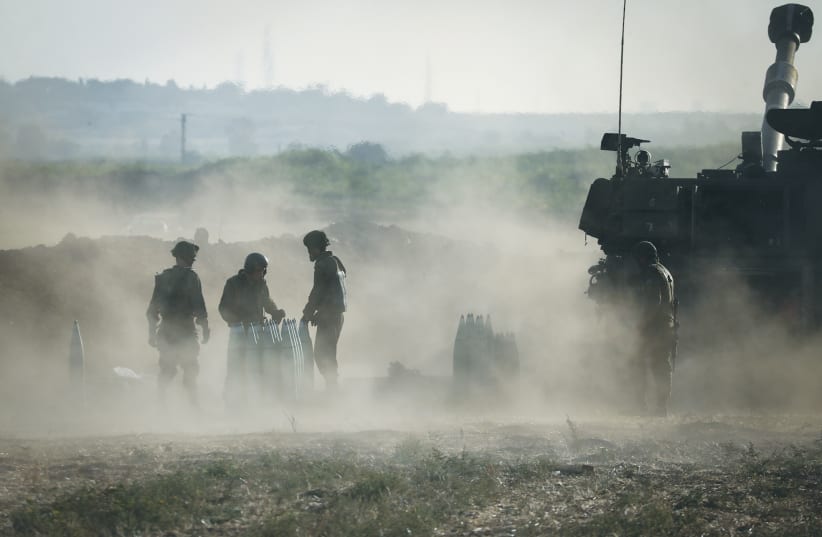His remarks, uncontested by the panel of commentators hearing him, would have left Israeli generals of the Six Day War speechless.
How could it be, they would ask, with 9,000 troops deployed in the Israeli areas contiguous to Gaza, no one suggested the need for a preemptive strike against the terrorists using the mortars? After all, the mortars Hamas uses, which had already injured an Israeli soldier deployed in the area, have an average range of five kilometers (three-plus miles), meaning the enemy is not deeply ensconced in Gaza but within relatively easy reach.
How, instead of attacking, do so many troops dig in but are nevertheless exposed to such attacks, especially since Hamas used this tactic successfully in the 2014 bout and in the subsequent smaller bouts in 2018 and 2019?
An ominous question emerges: Has the IDF, once famous for its attacking thrust, become an army that is unwilling to fight on the ground even when absolutely necessary, as in the case of the troops amassed along the Gaza perimeter? Will it forever make do with relying on a technological learning curve steeper than any other regional rival, such as the Iron Dome, or the intelligence derived from such technology to identify targets worthy of air strikes?
Reports of a coming wave of mortar attacks and the injuries of soldiers due to such an assault are not the only examples that compel raising this painful question.
On the fourth night of the offensive, the Israel Air Force made aviation history when it amassed 160 fighter jets and other air vehicles over the small space of Gaza to effectively pound over no more than 40 minutes the vast array of interlocking tunnels Hamas dug to protect its command posts, the flow of terrorists, and transportation of missiles and other ordinance. No doubt, the ability to coordinate such air traffic without mishap, even in the absence of a rival air force, will be studied by air force commanders and schools all over the world.
Unfortunately, many military staff colleges will also study why the territorial arm of the IDF and the political leaders who give the IDF its orders did not utilize the confusion that must have been created in Hamas ranks during and immediately after the attack to strike at the enemy on the ground.
One such a strike by elite units could conceivably have been aimed at the Hamas and Islamic Jihad terrorists who rushed to the entrances to save their fellow terrorists. Just as the IDF identified the routes of the “metro” network of cross-border attack tunnels, it is conceivable they knew the whereabouts of the entrances to these tunnels as well.
OBVIOUSLY, ISRAEL and the IDF as a hi-tech power is not beholden to its illustrious offensive past no more than the British cavalry units composed of aristocrats in the name of former glory were decimated by the machine guns and tanks in the trench battles in WWI. With more technological firepower at its disposal against weaker enemies than the conventional Arab armies of the past, it is only rational that the political leaders and the IDF change the proportions of the offensive-defensive mix guiding any fighting force.
But to rule out the use of ground forces altogether is unwise on moral, strategic and tactical grounds.
Morally, the belief that the army, from the chief of staff down to the army private, is duty-bound to protect the citizens in the rear, is crucial to maintaining the fighting spirit of any army.
That this is no longer empirically the case. In the past 20 years, the overwhelming percentage of deaths have been civilians hit in the rear rather than on the front. The recent conflict’s body count of 11 Israeli civilians and one soldier being one such indication, only reinforces the argument that territorial army strikes are important in themselves in maintaining this moral commitment.
Strategically, the Gaza arena is a classic example of the fallacy that wars can be won or even ended in a manner favorable to the stronger state against a non-state actor through technology, i.e. air warfare alone. The rhetoric that prevailed when Israeli decision-makers voted for withdrawal from Gaza in February 2005 – that Gaza would turn into a bombing run if Hamas dared launch a single rocket – turned into empty bravado only 11 days after Israel’s final withdrawal, when such missiles were launched, and 15,000 more subsequently.
Tactically, the use of ground forces will always be necessary to surprise the enemy and exact greater costs. One pressing example in the long war against Hamas are the missile launching pads, which the IAF has difficulties hitting (mostly due to considerations of collateral civilian casualties and damage). One can only imagine the impact of IDF elite infantry attacks on such launching pads during the fighting bout between Israel and Hamas.
Above all, the successful use of ground troops and even the occasional disaster (the military must be allowed to occasionally fail), contribute to a picture of victory and ultimately world public opinion.
Contrary to liberal perceptions, there are many more out there who like winners than there are Boycott, Divestment and Sanctions (BDS) movement supporters and antisemites, even if the case can be made that there is a difference between the two. The IDF must renew and reinvigorate its willingness to fight and the daring to do it well.
The writer is a professor in the Departments of Political Studies and Middle Eastern Studies at Bar-Ilan University.
